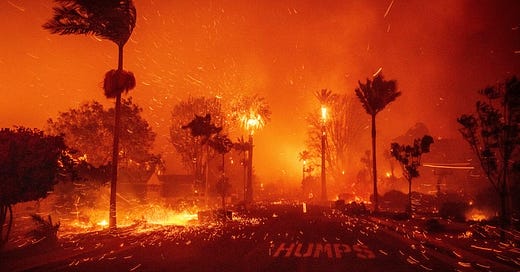I spend a lot of time listening to stories
Whether I’m reading conversations on social media or eavesdropping on strangers in a restaurant (don't judge) something inside me loves tapping into the heartbeat of where we are as a society.
Most of the time, I find people uplifting. I see their kindness and resilience in hard times, and it inspires me. I watch humans come together in surprising ways, and this reminds me that we still care for each other.
But every now and then, I notice patterns that are harder to shake—human behavior that lingers and leaves me feeling unsettled. What’s been sticking with me lately as I take in these stories—what’s putting a pit in my stomach—is this growing concern that, as a society, we are watching the slow death of empathy.
I feel it in the way we respond to tragedy, how we manage political discourse. I see it in how we talk about suffering, and the ways we justify anger. Just this week, take the wildfires in Los Angeles. The community of Palisades is almost completely gone. Tens of thousands of acres burned, lives destroyed. And yet, instead of an outpouring of compassion and love, I see unhinged conspiracy theories—claims that Hollywood caused the fires or that perhaps this is some sort of punishment by God for gay people.
If you’re on Instagram, you can see in real time the hate being thrown at celebrities who have lost everything, the general sentiment being that because they are wealthy, they are somehow deserving of terrible experiences. It’s a glaring reflection of the resentment building between the haves and the have-nots in this country. A divide that justifies anger, sure, but at the cost of undermining our humanity.
Just a month ago, a man named Luigi found heartthrob status on TikTok. You probably know him as the man who murdered a healthcare CEO as personal retribution for the failings of a broken healthcare system. When that story broke, I don’t know what I expected to happen, but what I sure as heck didn’t expect was an uprising of voices calling the man a hero. Commending him for “taking a stand”. I mean hear me out, I understand gallows humor. But the hate in that joke was too loud.
I understand people are angry. I feel angry myself. And to be honest, I don’t know what the answer is here. I wrestle with this because I relate to the hopelessness and fear that so many carry. Take the healthcare thing. I’m a cancer survivor. I had a bilateral mastectomy because I was afraid insurance might not cover my treatments down the road. So when I say I understand the deep frustration with systems that don’t seem to value life, believe me, I do.
But what I cannot reconcile is this utter lack of humanity.
It isn’t just showing up in comments about news stories. It’s everywhere, even in the small moments day to day. I know you can feel it—this growing sense of “us versus them,” this belief that if someone’s on the wrong side, they deserve whatever they get. These examples may seem worlds apart, but they all point to the same troubling trend—a growing callousness toward suffering, fueled by resentment and frustration.
When humanity loses its humanity, what are we even saving?
Empathy, I believe, is humanity’s lifeline. It’s our purest and greatest strength. It’s the connection that draws people together, even when the divide feels insurmountable. If we can learn to care for one another, even in our anger, we can create a world that is better. More gentle.
What that looks like is responding to grief with tenderness. Responding to anger with curiosity and understanding. And responding to injustice by taking action that uplifts others and respects our shared humanity. It looks like choosing to stop screaming at each other and fighting like children, and instead beginning to heal our wounds.
At the end of the day, I still believe in humanity. I still believe in the goodness of people. And I believe that empathy can indeed save us—if we will only allow it to survive.
Hey friends,
Your presence here means the world to me. Knowing you’ve taken the time to read thoughts on empathy and human kindness reassures me that these values still resonate.
If this article resonated with you, please consider sharing & subscribing to keep the conversation alive. I’ll always keep my content paywall-free because encouragement shouldn’t come at a cost. For those who choose to offer financial support, thank you for keeping the lights on.
With love and gratitude,
Mary Katherine





I've been noticing the slide away from empathy for a while, but it really hit home in November when more than 70 million people decided that basic human decency didn't matter. I started substitute teaching shortly thereafter, and I must say that if you want to increase empathy in the world, more people need to spend a few days with a teacher in a middle school classroom. What teachers do day in and day out is a master class in empathy. I wholeheartedly agree that to get through this, empathy will be the key.
Thank you for sharing about empathy. I just want to say that after 28 years in the Evangelical church I am now free. I have been fortunate enough to have Kristin Neff’s book Self-Compassion recommended to me. I am so excited about kindness, compassion and the love of humanity. I finally love me and others! I’m 70 years old and just came out of the closet and am thrilled to be living my best life. Finally I love you and all that you do for all of us. Your love and compassion can be felt through out all of your messages!